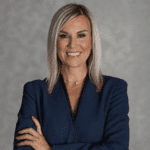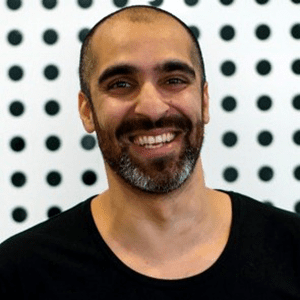

Sales shift: Transforming mindsets and cultivating growth in business leadership
In this episode, Ingrid Maynard and Stephanie Christopher discuss the challenges in sales, from overcoming stereotypes to addressing the talent shortage. Ingrid delves into the skills deficit within sales teams, the significance of observable behaviours and the untapped potential of sales functions as incubators for broader organisational strategies.
Business leaders will gain insights into the motivations of salespeople and practical strategies for transforming sales mindsets and fostering a positive sales culture.
Ingrid is the Founder and Managing Director of The Sales Doctor and has been transforming sales teams and leaders for over 25 years, using her unique insights and teachings based on behavioural modelling and neuroscience.
Stephanie: Welcome to TEC Live, Stephanie Christopher here, CEO of the Executive Connection. We connect leaders with a trusted network of people who help them succeed. My guest today is Ingrid Maynard, the founder and managing director of the Sales Doctor. Ingrid’s on a mission. She’s going to create a sales revolution and transform how people see and understand sales and salespeople. For over 25 years, Ingrid has worked with iconic Australian brands, including large listed and privately owned organisations to improve sales team performance. She’s known for ensuring the sales process enriches the salesperson, the customer, and others across the business value chain. Ingrid’s passion for salespeople and leaders to show up differently is underpinned by her pathway to enrichment philosophy, grounded in behavioral modeling and neuroscience, enabling teams to take different actions to achieve results consistently and effectively. Ingrid Maynard, welcome to TEC Live.
Ingrid: Thank you for having me.
Stephanie: It’s quite a mouthful of an introduction actually.
Ingrid: It is now, and congratulations.
Stephanie: And people don’t know this, but it took me about three takes, and I pride myself on not needing that.
Ingrid: That’s beautiful. Absolutely fantastic. Thank you.
Stephanie: It’s great to have you here, and thank you for joining us.
Ingrid: Pleasure.
Stephanie: I’m a salesperson from way back.
Ingrid: Yes.
Stephanie: But you’re not born a salesperson. I have this theory, and you might prove me wrong, that when I’m recruiting salespeople, I look for people who can say the word sales without flinching because someone who comes and says, ‘Oh, I’m not a pushy salesperson,’ I think they’re never going to be able to sell. Is that true?
Ingrid: Yeah. Well, possibly. I agree with you. I think that sales has become a dirty word, and I talk a lot about that. It’s unfortunate, actually, because when you think about the importance of a sales function and salespeople to the value of an organisation, they’re critical. Without revenue flowing in generated by salespeople, you don’t really have an organisation or you won’t have one for very long if you’re just relying on funds. So, it is unfortunate, and I think that some of our relationship to that word sales comes from a really long time ago, like we were saying earlier, from those associations and stereotypes that are perpetuated in movies, Biff Loman and some other movies like Glengarry Glen Ross where it’s that high pressure, trying to force somebody into an outcome that they hadn’t intended at all, where it’s really about the sales person’s advantage and at the expense of the person that they’re actually selling to.
That’s unfortunate because I actually haven’t seen that behaviour at all for probably about 20 years, which I’m not necessarily saying is a good thing. I’ll talk about that later. But that association with the word sales, I think when people have a really healthy perception of the value that they bring when they’re in sales, then that word has a totally different association with it. When they understand that selling is really about being of service to another human being, it’s about getting outside of yourself, it’s about really understanding what matters to that other person, then that word selling becomes something that’s joyous and value-driven.
Stephanie: Interesting. When you say joyous …
Ingrid: Yes.
Stephanie: I would suggest that there might be a different set of motivators for salespeople.
Ingrid: Yes.
Stephanie: And everyone isn’t motivated by the same thing.
Ingrid: No.
Stephanie: One salesperson might be very motivated by recognition and public recognition, and that might be a massive de-motivator for another.
Ingrid: Yeah, you’re right.
Stephanie: One might be really motivated by immersing themselves in a complex deal and understanding the ins and outs of them, and that might be really demotivating for someone else who just wants a retail transaction, one, one, one. Is that part of the stereotype, do you think, that people are thinking that salespeople are one type?
Ingrid: Unfortunately, yes. I think that when people are recruiting for salespeople, they tend to look for those people that have that strong transactional mentality, and there are roles that that’s absolutely suitable for.
Stephanie: Retail.
Ingrid: Yeah, retail and also ones that don’t have a long sales cycle where it’s more immediate. You need those people, but those people also really struggle with those longer-term sales cycles. So, if you’ve got somebody who really enjoys the satisfaction that comes from creating sale after sale after sale after sale in a more immediate sales environment and then you try to shoehorn them-
Stephanie: Into a complex, sophisticated …
Ingrid: … they really struggle. It’s almost setting them up for failure. Some people I’ve just found, like you said, are motivated by different levers, and so finding people who have the right fit and just that right approach to what it is that they’re meant to be doing and understanding how to do either complex sales or those more immediate sales is really key. But they are very different people.
I find that the people that are able to work across complex deals and put those together, work across long-term customer relationships, not only hunting them but also progressing them, nurturing them, not leaving opportunity on the table, they’re people that almost have detective skills. They’re curious. They’re patient. They have a strategy in mind, and they’re able to plan that strategy-
Stephanie: They’re discerning.
Ingrid: Yes, they are.
Stephanie: They’re discerning because they know what they’re seeing, and they’re making connections.
Ingrid: Yes, they are. And they understand that it’s not just about the decision-maker. There’s multiple stakeholders in that kind of environment as well. Whereas that more transactional, more immediate sales environment, you’re standing in front of or you’re sitting in front of that key decision-maker.
Stephanie: Yeah. That’s the world of sales and the world of the sales team, which is fascinating. Fascinating and hours of conversation. Let’s lift it now to the organisation level.
Ingrid: Okay.
Stephanie: So many of our members would be saying right now that sales is their biggest issue.
Ingrid: Yes.
Stephanie: Or so many businesses.
Ingrid: Yeah.
Stephanie: And it always is.
Ingrid: Yeah.
Stephanie: But you can’t say that and then have a bias against sales and salespeople, can you?
Ingrid: Well, you’re going to struggle. If there’s a negative association with the function of selling and the way that you go about selling regardless of where that comes from, and yet, that’s what you need to do, there’s just going to be that inner conflict. An organisation is an organism. So, if that’s part of the culture that there’s almost an anti-sales … It might not be overt. It might not be something that anyone would be able to say, ‘Oh, yes, that’s on our wall. We’re not salespeople,’ but there’s an understanding that that’s not the way that we do things here, and yet that’s what we need to achieve, there’s going to be conflict. And when there’s conflict, people go around things and they’re not taking the most direct route to market.
Unfortunately with that, they get in their own way, and they’re not open to new ways of working. Yeah, at an organisational level, sales has never been more important, but there are some challenges today for most organisations. I think one of the challenges is, it’s the talent shortage. Do you know that breakfast that we went to in Adelaide?
Stephanie: I do, yes.
Ingrid: Yes, that was fantastic. But what Warren-
Stephanie: Thank you.
Ingrid: Yeah, it was. It really was. What Warren said that really struck me to my core and was reaffirming was he said the talent shortage isn’t going anywhere. When we look at the statistics around the sales talent shortage, it’s even more acute. Even if you can find what most of the audience will understand, warm bodies to fulfill some of those roles, even then you have a skills deficit. When I talk about a sales talent shortage, I’m talking about both. If you are an organisation coming back to that association with the word sales, so you find those people and you don’t have a positive association with selling or sales, and you need those warm bodies to then perform, how on Earth are you going to do that?
Stephanie: I think you’ve just said something that connects with another thought I was having. It may not just be a negative bias against sales. It might be a bit of a fear and ignorance. Not ignorance, but fear. I don’t know enough about this. I’m hopeless at this. I can’t sell. I don’t know what they do. So, there’s that thought. And then the other one is, you’ve just said something really interesting about even if you have warm bodies, you have a skills deficit.
Let’s come back to that because you can employ all the right people, but there’s always a skills deficit in a sales team because it’s always something that needs renewal and improvement.
Ingrid: You’re right.
Stephanie: We’ll come back to that. But let’s talk about the leader of a business, a business owner, a CEO, a GM that is scared. I’ve got one for you, someone in a professional services firm.
Ingrid: Okay, yep.
Stephanie: Any of those roles where, yeah, exactly. You should see Ingrid’s face. It’s just a face of completely understand where I’m going. Where one of your KPIs is you’ve got to fill your own book. You’ve got to bring your own thing. You’ve got to bring your own people. It must be hard for a leader in an organisation to have to think about driving growth through sales when they’re quite scared of this idea.
Ingrid: Yeah, they’re scared of the idea, and they’re scared that if they ‘sell’ in inverted commas, it will damage the relationship. They don’t want to be seen as sales-y. Professional services firms have really shied away from that word. They call their partners anything other than sales. There’s never a sales word in the title. It’s always business development, client relationship, client liaison, partnerships.
Stephanie: Special special, I’m here to help you.
Ingrid: Exactly.
Stephanie: You know a funny thing, just when you said that, I had a job as a sales VP. I was hired as a sales VP years ago now, 15, 16 years ago, and I remember one of my teams said, ‘She’s a bit sales-y, isn’t she?’ I was like, ‘Um.’
Ingrid: Like it was a bad thing.
Stephanie: Yeah. I was like, ‘Number one, no, I’m not. And number two, isn’t that why they hired me?’ Then, I clocked like, ‘Right, we might have a skills deficit here or a mindset problem.’ That’s a long time ago and well in the past, but I think it’s fascinating when you say people shy away from the word. It doesn’t matter what you call the exchange of value.
So, let’s get back to this business owner who’s scared thinking, ‘It’s going to damage relationships. It’ll damage my reputation, and I may not be good at it.’
Ingrid: Yeah, I may not be good at it. They don’t understand what it really is and how to go about it.
Stephanie: What it is.
Ingrid: Yeah, exactly, and also understanding the different requirements along the way. First, you really need to be able to have a good solid connection with another human being, and that’s usually where … So, the people that think of themselves as really strong with relationships, that’s where it begins and ends. And they have an issue or a fear around having a commercial conversation. They don’t understand how to do that and uncover what that measure of value is going to be from the client’s perspective and then be able to talk about their differentiators around some of those issues to enable the customer to join the dots and understand that, ‘If I work with that person, I’m going to get this level of value because I’ve now articulated for myself through the facilitation of the salesperson what that value actually is.’
So, they’re scared to have that. And then you’ve got the people that are just really product-driven and talk about product like it’s going to sell itself. They think that they’ve almost got to be walking brochures of technical expertise, and that’s where you get as a business owner or as a sales leader, people coming to you saying, ‘I don’t have enough product knowledge. I can’t sell this because I don’t know enough about the product.’ They don’t understand that it’s not the product or the features.
Stephanie: It’s the customer.
Ingrid: It’s the customer, and it’s what that product or service does for the customer that they couldn’t do without it. That’s the piece that’s really valuable.
Stephanie: I hear that so much. I don’t have enough product knowledge. The reverse is if a salesperson walks into the room with me and opens up a laptop and it’s about to do a demonstration, it’s a joke in the business. I’ve had one of my teams say, ‘You’ve got two minutes till she leaves to take a phone call, so make it snappy,’ because it’s nothing about me.
Ingrid: Yeah, that’s right.
Stephanie: It’s about them.
Ingrid: Right.
Stephanie: I could look up them online. I don’t need someone to tell me about them.
Ingrid: I’ve just got goosebumps because I feel like taking what you’ve just said and putting that up on a poster somewhere. It’s not about me. It’s about them. If more people associated selling with that phrase and that phrase alone, we’d have very, very different levels of conversation.
Stephanie: The world would be a better place.
Ingrid: It would. I think it would, yeah.
Stephanie: I’m just trying to get my thinking here. Let’s start with what you said about a skills deficit in a sales team.
Ingrid: Yeah.
Stephanie: Tell me about that.
Ingrid: Yeah.
Stephanie: How do you address that?
Ingrid: Well, this is a space I’ve been in for over 25 years, and I have a passion for salespeople because they never pass go, really. They’re only ever measured on their past performance, their most recent sale. And they’re the most visibly obvious performers in a business. So, I really feel for them. Everything’s fine, and everyone ignores them while everything seems to be ticking along, even when there’s a skills deficit there because they think, ‘Oh, look. They’re achieving target. Leave them alone.’
Stephanie: Don’t touch them.
Ingrid: Yeah, don’t touch it.
Stephanie: Don’t mess with the …
Ingrid: Don’t mess with it. It’s working. But as soon as things start to happen, even from the outside, like you might have a new competitor come into the space where previously you dominated or that person dominated, you might have a downturn in the market, and so all of a sudden, the available spend shrinks. You might have the same value for a product, but all of a sudden, the percentage of that spend has significantly gone up. So, something that might’ve been 5% of spend is now all of a sudden 20%. And if you’re a salesperson that doesn’t have the skillset to be able to communicate value delivered in an easy way for the client to understand, then you’ve got that issue there too.
Look, I really feel for sales. When we come to an organisation, when I come to an organisation and we talk about what’s required, gee, it’s just such a varying degree of skills. Some people are brand new, have never sold before, and so need very clear basics of what selling actually is. Then you’ve got other people who don’t … I know this sounds terrible, but they don’t necessarily understand their role. They don’t understand what’s required of them, and then even when they understand the metric that they’ll be measured on, they don’t understand the how. They don’t understand the behaviours that are required in order to achieve that goal, and so it’s about breaking that down for them and giving them tools that they can lean on.
Then you’ve got other people who are new to sales leadership. you would’ve seen this, Stephanie, where you’ve got people that have been the best salespeople, and then they’re plucked out of that.
Stephanie: Classic. So, you lose your best salesperson.
Ingrid: You know what I’m talking about.
Stephanie: Yeah. You lose your best salesperson.
Ingrid: And you get an inexperienced sales leader. What can go wrong? All of a sudden, then they feel the heat because sales performance is going down. And if they’ve never been trained, so they don’t understand actually what that pathway to success for them was, their own success recipe, they’ve just lucked on something through trial and error, they’ve grabbed onto it, they’ve kept repeating it, and then all of a sudden they’re plucked out of that, they don’t understand how to help other people who are struggling to be good at selling because it was so natural for them. One person’s way of selling is not everyone’s way of selling. There isn’t one formula or one size fits all. There are certain behaviours that are going to be good for everyone to adopt, but the way that they adopt them will be personal.
Stephanie: How do you identify what the behaviors need to be-
Ingrid: Great question.
Stephanie: … so that you can coach and upskill a diverse team?
Ingrid: Well, I’m loving your question because that comes from a very deep understanding of sales. That to me says everything about you.
Stephanie: You’re a great guest, Ingrid, very positive.
Ingrid: Oh, well, no, no, no. I’m on t-shirts.
Stephanie: You’re on canvases in my office.
Ingrid: No, no, no. Behaviour is everything. For me, sales is an action game, and you can’t think your way into it. You need to behave your way into it. But understanding the behaviours that are going to lead to the outcomes is key. It’s the thing that really helps a sales coach or a sales leader be good at what they do. In my opinion, every business needs to have a model of excellence. What I normally do is I take their best model of excellence and say, ‘Okay, let’s reverse engineer what it is that they do really well into observable behaviours to create a set of behaviours according to how they sell … and the different types of roles will be different and have different behaviours … in order for not only a new person, but that person to also understand what good looks like and how to execute.’
You mentioned it in the intro, but I talk about being effective and consistent. You need to have both of those things because if you are only consistent with poor behaviors, that’s not going to work. And if you’re effective inconsistently, that’s not going to work, so you need to understand both. You need to have the behaviours that are going to be effective in that role and apply them consistently.
Stephanie: Those behaviours may include activity.
Ingrid: Oh, absolutely, yeah. It’s about the quality of how they’re executing those behaviours, and that will be individual. Then what you can do with that, once you’ve got that person, that salesperson can use that as a self-coaching tool so that they can say, ‘Okay, well how did I go there? Did I achieve my outcome? Where did I fall down?’ And they’ve got the clues there because they’ve got all of the observable behaviours of what they should have done, and then they can identify and pinpoint what they perhaps failed to do or what they didn’t do to the degree that they needed to. Then they can go back over that in their minds, think about what they need to go back with that client to fix.
As a sales leader, you’ve got a tool that takes all of the subjectivity out of behaviour because that’s normally very subjective. You’ve got that objective criteria. You’re both sitting down talking about the behaviours so that you can coach to that more effectively. You can set greater action. That’s why I loved what you said because most people don’t think about sales as a set of behaviours. They think of sales as a set of targets, and that’s the difference.
Stephanie: Yeah, right. That’s the game changer with anything in strategy implementation is the lead indicators.
Ingrid: Yes. Sorry for anyone listening. It was just championing that statement as well. Again, you know how when you’re in a business and you’ve just recruited somebody and you take … We’re talking about sales talent shortage here and warm bodies and talent and skills, how you find this person. You think, ‘Oh, we’ve recruited them, we’ve found them, we’ve interviewed them, we’ve referenced-checked them. We are getting them on board.’ You might have a trial period of, say, six months, and you think, ‘Oh, no, that’s good. Six months will give us a really good-
Stephanie: Such a long time, really long time.
Ingrid: Yeah, such a long time, but what if your sales cycle is three years? How do you actually evaluate the performance of that person because clearly they’re not necessarily going to have the target by that stage? So, how are you going to evaluate that person’s ability to potentially achieve that target without those leading indicators? They’re the difference. If those people are performing those behaviours, which are leading indicators, consistently and effectively, they’re on track to achieve their target. But without those, you’re using your gut instinct, and you might as well be just checking the direction of the wind.
Stephanie: Well, you’re trying to predict two years from now-
Ingrid: Yeah, exactly.
Stephanie: … and that whole, they’re going to make it, not going to make it. It’s awful.
Ingrid: Yes.
Stephanie: So, a hypothesis then about the business leader who’s a little fearful or cynical or something of sales, they could actually look at a well-run sales function and see part of the business that they really need to apply to the rest of the business. If they’ve got a function that they get right, because it’s observable, lead indicators, behaviours, self-reflective, self-coaching people, and clear outcomes, that’s the challenge for every business leader across the whole organisation.
Ingrid: Yes, and yet …
Stephanie: And yet they don’t because sales is often isolated as a team or departmental thing, but actually it could be an incubator for the very best strategy design and implementation.
Ingrid: Wow, yes, it could be. Yes.
Stephanie: So, where do you start with a leader who really needs to get their sales function humming and they’re just saying all that stuff to you that we’ve talked about?
Ingrid: Oh, what do I say?
Stephanie: Yeah.
Ingrid: Well, the first thing would be really thinking about what their vision for the future is in relation to where they are at the moment, and then I take them on a journey because without that leader really understanding what’s required and the fact that things don’t happen overnight, there is no silver bullet. I know I’m preaching to the choir here, but there is no silver bullet when it comes to selling, particularly if salespeople have been left to their own devices for the longest time. There’s been no accountability. There’s been no oversight. There’s been no support really. And all of a sudden, we now need to do something with our salespeople, and the leader of the organisation is thinking, ‘Gosh, I thought that the sales manager or the national sales manager or the sales director would be all over that. But actually, it’s really important that they have a sales mindset as well because their vision for the future of the organisation will be in direct proportion to the ability of the sales function to be able to help them to realise that.
Moreover, I like how you talked about the sales function being an incubator of strategy design. I just went, ‘Gosh, it’s amazing.’ But that really … When you think about the behaviours, what good looks like there, and you transmute that out across the business, you then develop a high-performing culture with the business that is all measured on their performance of certain types of behaviours, remembering that everyone in the organisation actually has a customer. They’re delivering value. There’s a value exchange between everyone in an organisation, and how are we treating everyone inside the organisation around the business ecosystem and beyond as a customer?
Stephanie: Really, yeah. Interesting. And I love that wave. You could start in one area and go broad, or you could start at the beginning and go. Ingrid, so interesting. Sales teams, a sales mindset through an organisation, everyone has a customer. That’s critical. There’s so much to unpack in this conversation, and I’ve enjoyed it. I’ve loved swapping ideas with you.
Ingrid: Me too.
Stephanie: Ingrid Maynard, thank you so much for joining us on TEC Live.
Ingrid: I’ve got the biggest smile on my face. Stephanie, thank you so much for having me.
Stephanie: That’s TEC Live for today. CEOs are in the business of making decisions, and leadership is the art of execution. I’m Stephanie Christopher and look forward to talking to you next time.



